Communication Skills Practice Report: Health and Social Care Context
VerifiedAdded on 2020/10/22
|8
|1752
|283
Report
AI Summary
This report provides a detailed analysis of communication skills within the health and social care sector. It begins with an introduction emphasizing the crucial role of communication in assessing and managing business activities, particularly in improving staff capabilities and service effectiveness. The main body of the report delves into the process of evidence-based practices (EBP) in health and social care, outlining the six key steps involved. It then explores the skills and qualities necessary for conducting a literature review in this context, emphasizing research, article selection, and critical evaluation skills. The Gibbs reflective model is applied to analyze personal skills and knowledge, focusing on ethical considerations in selecting sources and the limitations faced. A Gantt chart and work breakdown structure are presented to manage key deliverables and a high-level timeline for assignment activities is evaluated. The conclusion reiterates the importance of effective communication management and the application of research practices to improve assessment processes within health and social care, including an evaluation of the Gibbs model and SMART action plans.
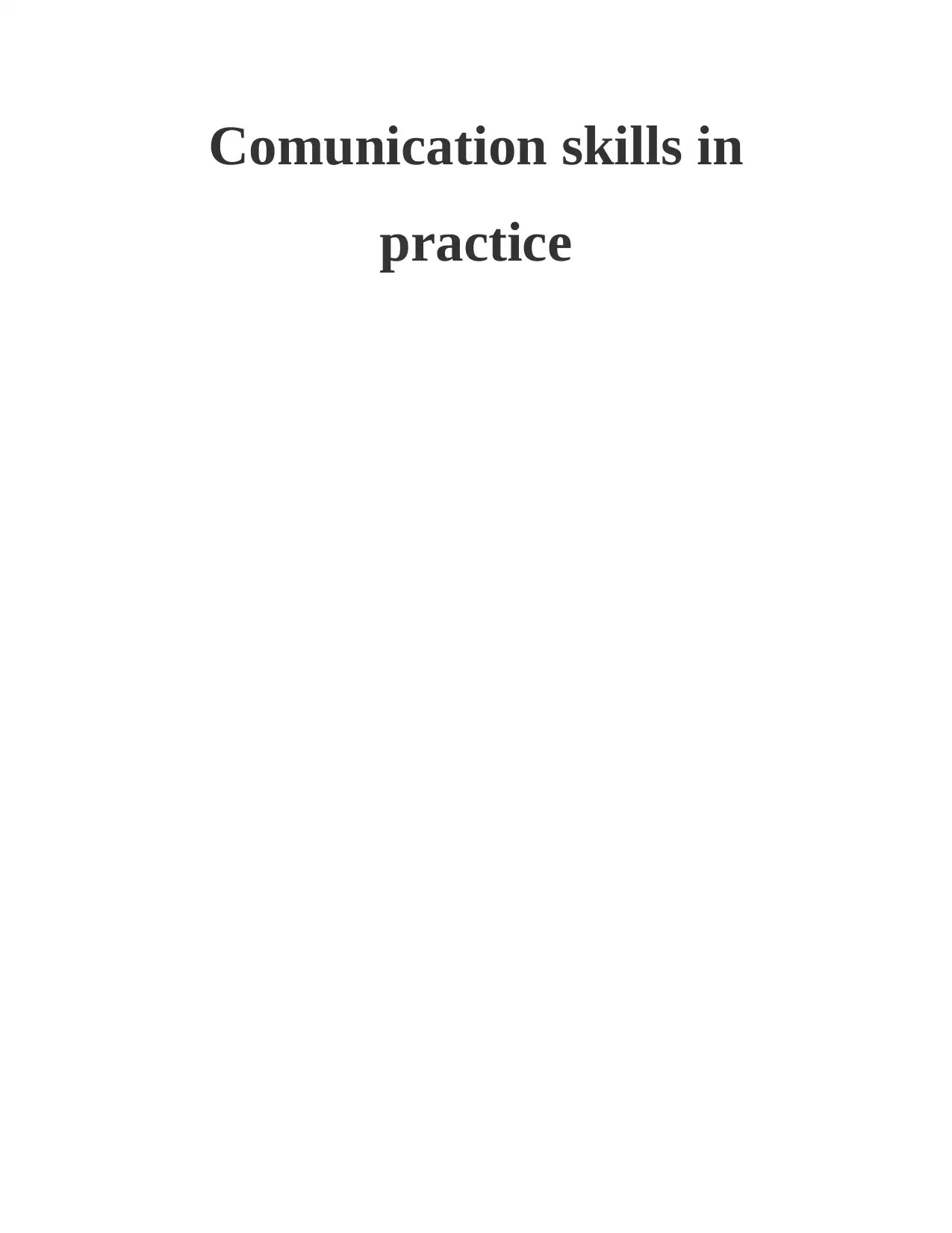
Comunication skills in
practice
practice
Paraphrase This Document
Need a fresh take? Get an instant paraphrase of this document with our AI Paraphraser
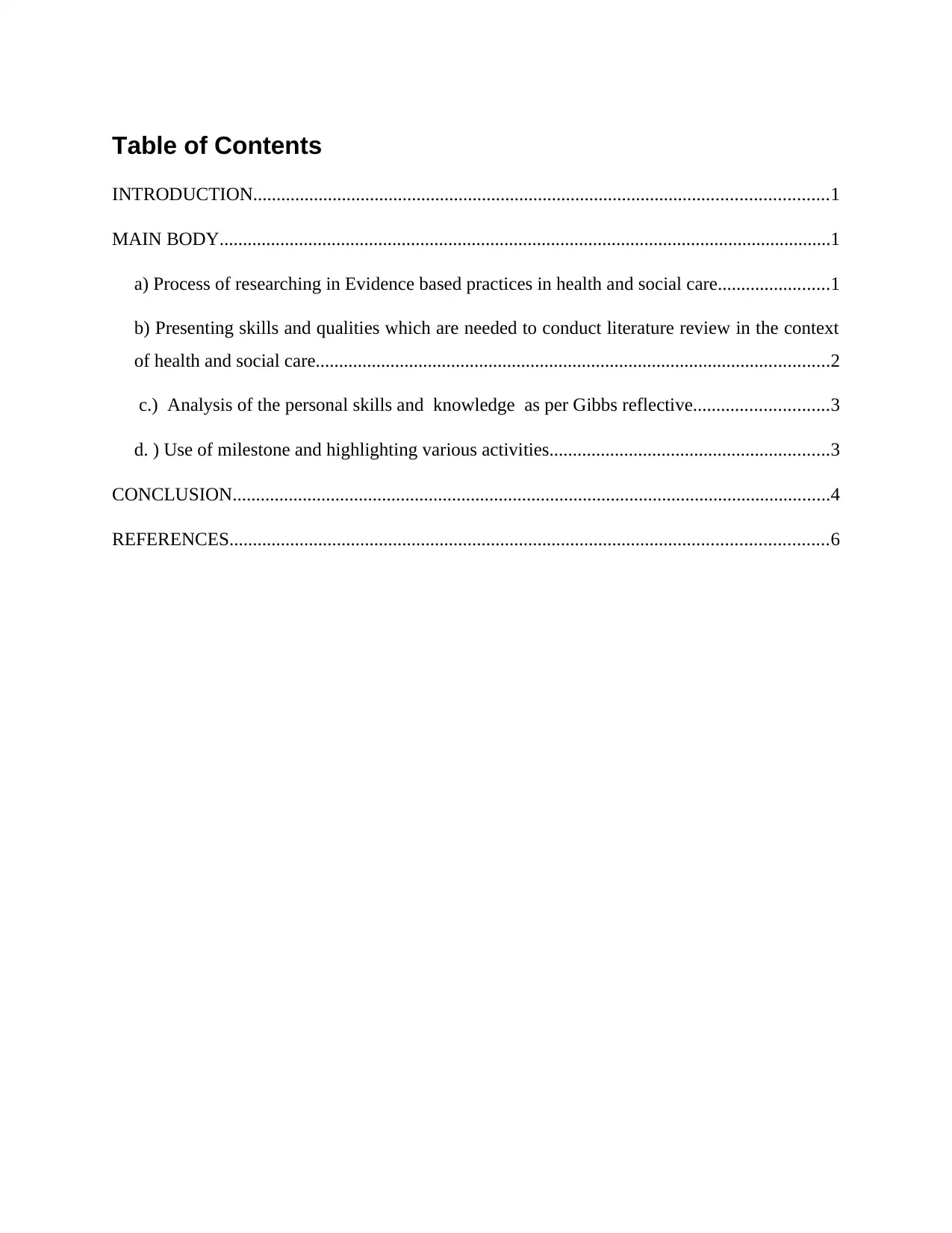
Table of Contents
INTRODUCTION...........................................................................................................................1
MAIN BODY...................................................................................................................................1
a) Process of researching in Evidence based practices in health and social care........................1
b) Presenting skills and qualities which are needed to conduct literature review in the context
of health and social care..............................................................................................................2
c.) Analysis of the personal skills and knowledge as per Gibbs reflective.............................3
d. ) Use of milestone and highlighting various activities............................................................3
CONCLUSION................................................................................................................................4
REFERENCES................................................................................................................................6
INTRODUCTION...........................................................................................................................1
MAIN BODY...................................................................................................................................1
a) Process of researching in Evidence based practices in health and social care........................1
b) Presenting skills and qualities which are needed to conduct literature review in the context
of health and social care..............................................................................................................2
c.) Analysis of the personal skills and knowledge as per Gibbs reflective.............................3
d. ) Use of milestone and highlighting various activities............................................................3
CONCLUSION................................................................................................................................4
REFERENCES................................................................................................................................6
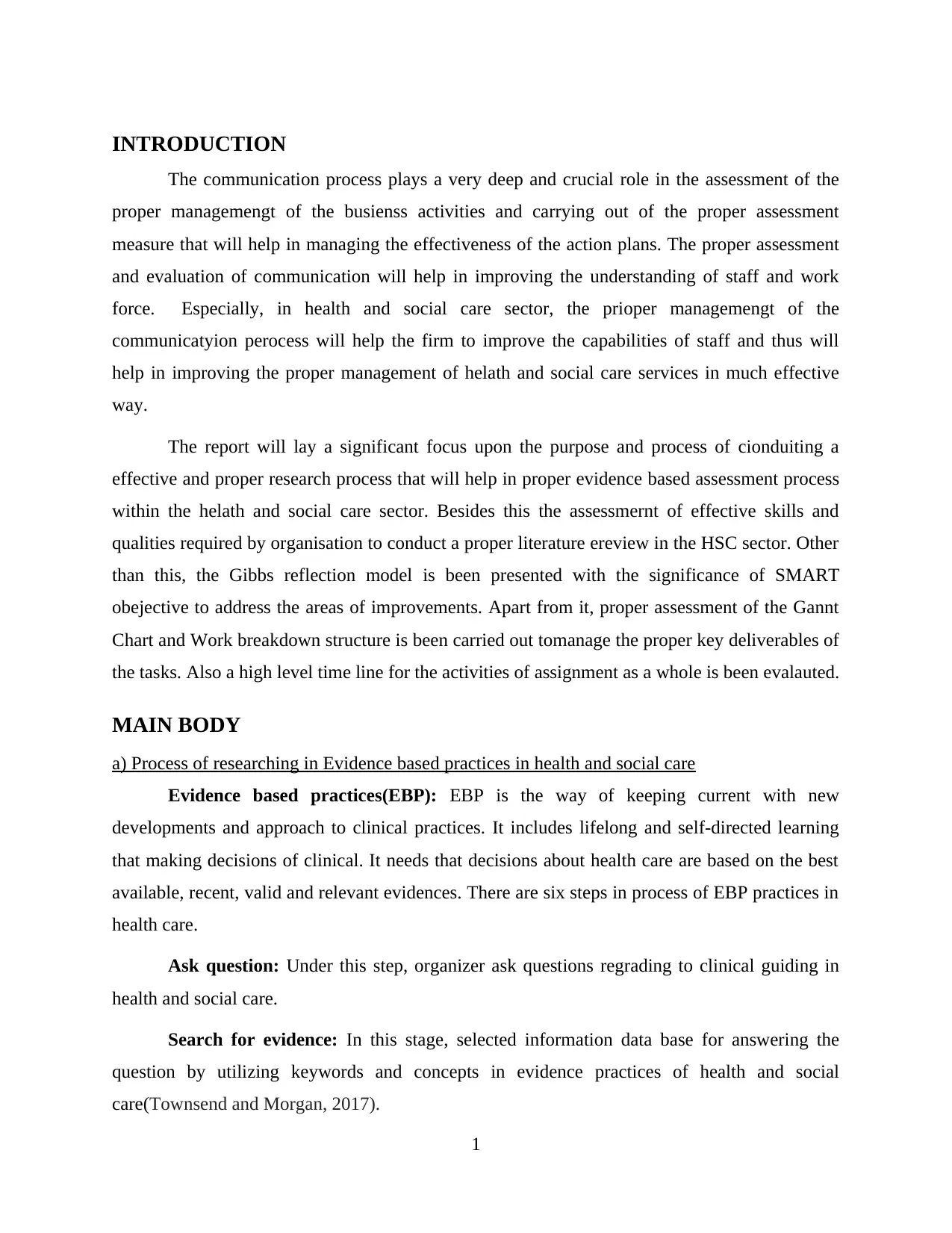
INTRODUCTION
The communication process plays a very deep and crucial role in the assessment of the
proper managemengt of the busienss activities and carrying out of the proper assessment
measure that will help in managing the effectiveness of the action plans. The proper assessment
and evaluation of communication will help in improving the understanding of staff and work
force. Especially, in health and social care sector, the prioper managemengt of the
communicatyion perocess will help the firm to improve the capabilities of staff and thus will
help in improving the proper management of helath and social care services in much effective
way.
The report will lay a significant focus upon the purpose and process of cionduiting a
effective and proper research process that will help in proper evidence based assessment process
within the helath and social care sector. Besides this the assessmernt of effective skills and
qualities required by organisation to conduct a proper literature ereview in the HSC sector. Other
than this, the Gibbs reflection model is been presented with the significance of SMART
obejective to address the areas of improvements. Apart from it, proper assessment of the Gannt
Chart and Work breakdown structure is been carried out tomanage the proper key deliverables of
the tasks. Also a high level time line for the activities of assignment as a whole is been evalauted.
MAIN BODY
a) Process of researching in Evidence based practices in health and social care
Evidence based practices(EBP): EBP is the way of keeping current with new
developments and approach to clinical practices. It includes lifelong and self-directed learning
that making decisions of clinical. It needs that decisions about health care are based on the best
available, recent, valid and relevant evidences. There are six steps in process of EBP practices in
health care.
Ask question: Under this step, organizer ask questions regrading to clinical guiding in
health and social care.
Search for evidence: In this stage, selected information data base for answering the
question by utilizing keywords and concepts in evidence practices of health and social
care(Townsend and Morgan, 2017).
1
The communication process plays a very deep and crucial role in the assessment of the
proper managemengt of the busienss activities and carrying out of the proper assessment
measure that will help in managing the effectiveness of the action plans. The proper assessment
and evaluation of communication will help in improving the understanding of staff and work
force. Especially, in health and social care sector, the prioper managemengt of the
communicatyion perocess will help the firm to improve the capabilities of staff and thus will
help in improving the proper management of helath and social care services in much effective
way.
The report will lay a significant focus upon the purpose and process of cionduiting a
effective and proper research process that will help in proper evidence based assessment process
within the helath and social care sector. Besides this the assessmernt of effective skills and
qualities required by organisation to conduct a proper literature ereview in the HSC sector. Other
than this, the Gibbs reflection model is been presented with the significance of SMART
obejective to address the areas of improvements. Apart from it, proper assessment of the Gannt
Chart and Work breakdown structure is been carried out tomanage the proper key deliverables of
the tasks. Also a high level time line for the activities of assignment as a whole is been evalauted.
MAIN BODY
a) Process of researching in Evidence based practices in health and social care
Evidence based practices(EBP): EBP is the way of keeping current with new
developments and approach to clinical practices. It includes lifelong and self-directed learning
that making decisions of clinical. It needs that decisions about health care are based on the best
available, recent, valid and relevant evidences. There are six steps in process of EBP practices in
health care.
Ask question: Under this step, organizer ask questions regrading to clinical guiding in
health and social care.
Search for evidence: In this stage, selected information data base for answering the
question by utilizing keywords and concepts in evidence practices of health and social
care(Townsend and Morgan, 2017).
1
⊘ This is a preview!⊘
Do you want full access?
Subscribe today to unlock all pages.

Trusted by 1+ million students worldwide
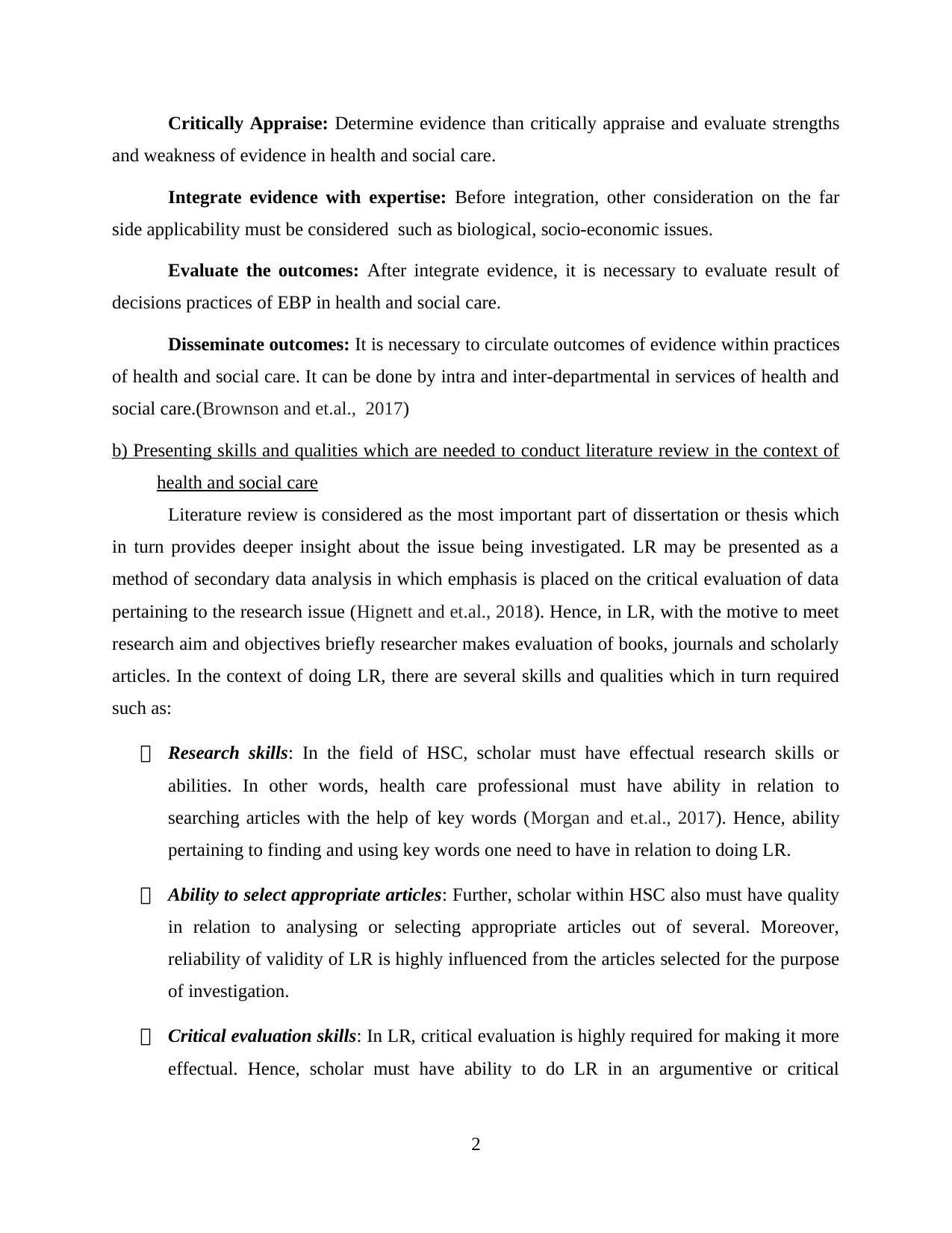
Critically Appraise: Determine evidence than critically appraise and evaluate strengths
and weakness of evidence in health and social care.
Integrate evidence with expertise: Before integration, other consideration on the far
side applicability must be considered such as biological, socio-economic issues.
Evaluate the outcomes: After integrate evidence, it is necessary to evaluate result of
decisions practices of EBP in health and social care.
Disseminate outcomes: It is necessary to circulate outcomes of evidence within practices
of health and social care. It can be done by intra and inter-departmental in services of health and
social care.(Brownson and et.al., 2017)
b) Presenting skills and qualities which are needed to conduct literature review in the context of
health and social care
Literature review is considered as the most important part of dissertation or thesis which
in turn provides deeper insight about the issue being investigated. LR may be presented as a
method of secondary data analysis in which emphasis is placed on the critical evaluation of data
pertaining to the research issue (Hignett and et.al., 2018). Hence, in LR, with the motive to meet
research aim and objectives briefly researcher makes evaluation of books, journals and scholarly
articles. In the context of doing LR, there are several skills and qualities which in turn required
such as:
Research skills: In the field of HSC, scholar must have effectual research skills or
abilities. In other words, health care professional must have ability in relation to
searching articles with the help of key words (Morgan and et.al., 2017). Hence, ability
pertaining to finding and using key words one need to have in relation to doing LR.
Ability to select appropriate articles: Further, scholar within HSC also must have quality
in relation to analysing or selecting appropriate articles out of several. Moreover,
reliability of validity of LR is highly influenced from the articles selected for the purpose
of investigation.
Critical evaluation skills: In LR, critical evaluation is highly required for making it more
effectual. Hence, scholar must have ability to do LR in an argumentive or critical
2
and weakness of evidence in health and social care.
Integrate evidence with expertise: Before integration, other consideration on the far
side applicability must be considered such as biological, socio-economic issues.
Evaluate the outcomes: After integrate evidence, it is necessary to evaluate result of
decisions practices of EBP in health and social care.
Disseminate outcomes: It is necessary to circulate outcomes of evidence within practices
of health and social care. It can be done by intra and inter-departmental in services of health and
social care.(Brownson and et.al., 2017)
b) Presenting skills and qualities which are needed to conduct literature review in the context of
health and social care
Literature review is considered as the most important part of dissertation or thesis which
in turn provides deeper insight about the issue being investigated. LR may be presented as a
method of secondary data analysis in which emphasis is placed on the critical evaluation of data
pertaining to the research issue (Hignett and et.al., 2018). Hence, in LR, with the motive to meet
research aim and objectives briefly researcher makes evaluation of books, journals and scholarly
articles. In the context of doing LR, there are several skills and qualities which in turn required
such as:
Research skills: In the field of HSC, scholar must have effectual research skills or
abilities. In other words, health care professional must have ability in relation to
searching articles with the help of key words (Morgan and et.al., 2017). Hence, ability
pertaining to finding and using key words one need to have in relation to doing LR.
Ability to select appropriate articles: Further, scholar within HSC also must have quality
in relation to analysing or selecting appropriate articles out of several. Moreover,
reliability of validity of LR is highly influenced from the articles selected for the purpose
of investigation.
Critical evaluation skills: In LR, critical evaluation is highly required for making it more
effectual. Hence, scholar must have ability to do LR in an argumentive or critical
2
Paraphrase This Document
Need a fresh take? Get an instant paraphrase of this document with our AI Paraphraser
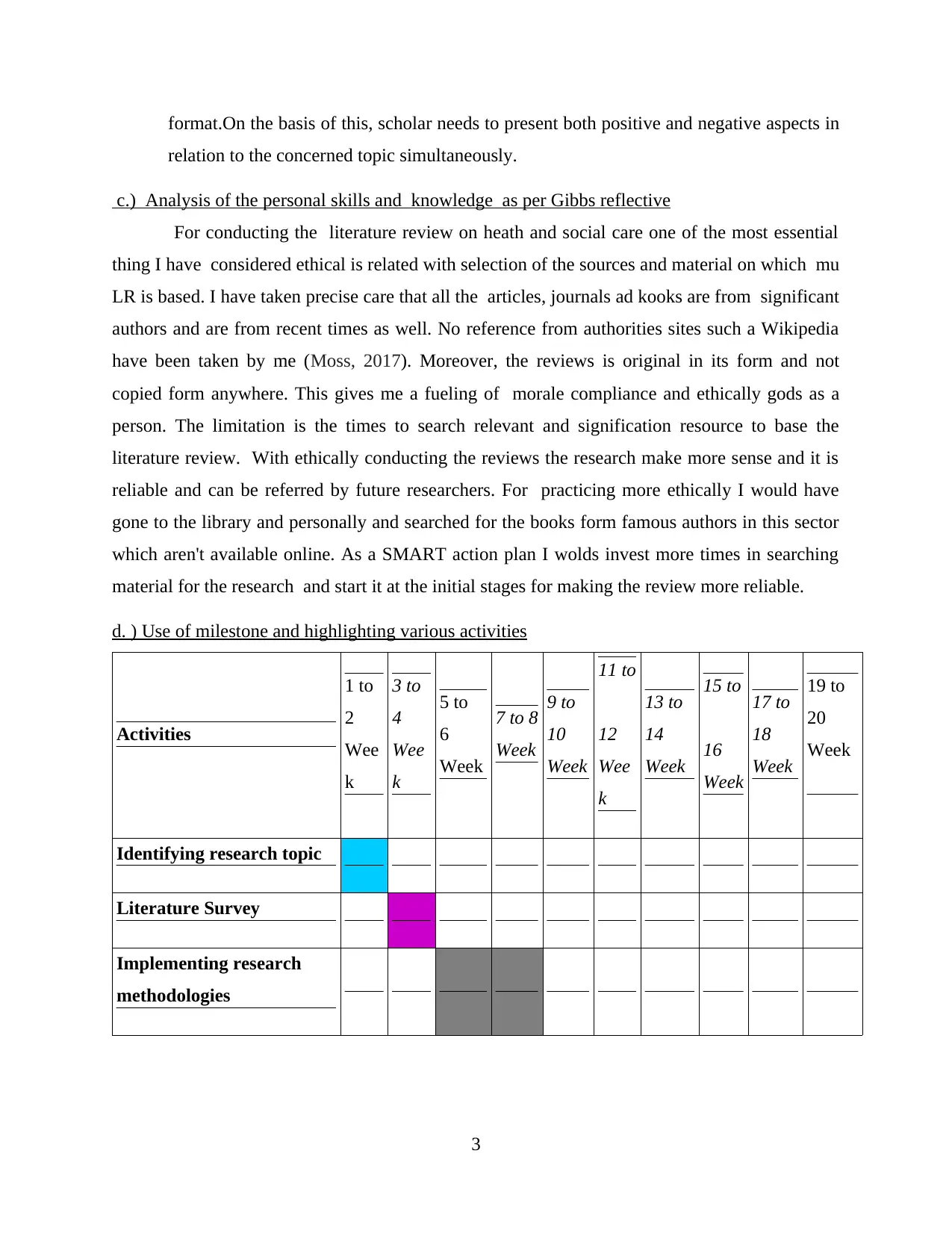
format.On the basis of this, scholar needs to present both positive and negative aspects in
relation to the concerned topic simultaneously.
c.) Analysis of the personal skills and knowledge as per Gibbs reflective
For conducting the literature review on heath and social care one of the most essential
thing I have considered ethical is related with selection of the sources and material on which mu
LR is based. I have taken precise care that all the articles, journals ad kooks are from significant
authors and are from recent times as well. No reference from authorities sites such a Wikipedia
have been taken by me (Moss, 2017). Moreover, the reviews is original in its form and not
copied form anywhere. This gives me a fueling of morale compliance and ethically gods as a
person. The limitation is the times to search relevant and signification resource to base the
literature review. With ethically conducting the reviews the research make more sense and it is
reliable and can be referred by future researchers. For practicing more ethically I would have
gone to the library and personally and searched for the books form famous authors in this sector
which aren't available online. As a SMART action plan I wolds invest more times in searching
material for the research and start it at the initial stages for making the review more reliable.
d. ) Use of milestone and highlighting various activities
Activities
1 to
2
Wee
k
3 to
4
Wee
k
5 to
6
Week
7 to 8
Week
9 to
10
Week
11 to
12
Wee
k
13 to
14
Week
15 to
16
Week
17 to
18
Week
19 to
20
Week
Identifying research topic
Literature Survey
Implementing research
methodologies
3
relation to the concerned topic simultaneously.
c.) Analysis of the personal skills and knowledge as per Gibbs reflective
For conducting the literature review on heath and social care one of the most essential
thing I have considered ethical is related with selection of the sources and material on which mu
LR is based. I have taken precise care that all the articles, journals ad kooks are from significant
authors and are from recent times as well. No reference from authorities sites such a Wikipedia
have been taken by me (Moss, 2017). Moreover, the reviews is original in its form and not
copied form anywhere. This gives me a fueling of morale compliance and ethically gods as a
person. The limitation is the times to search relevant and signification resource to base the
literature review. With ethically conducting the reviews the research make more sense and it is
reliable and can be referred by future researchers. For practicing more ethically I would have
gone to the library and personally and searched for the books form famous authors in this sector
which aren't available online. As a SMART action plan I wolds invest more times in searching
material for the research and start it at the initial stages for making the review more reliable.
d. ) Use of milestone and highlighting various activities
Activities
1 to
2
Wee
k
3 to
4
Wee
k
5 to
6
Week
7 to 8
Week
9 to
10
Week
11 to
12
Wee
k
13 to
14
Week
15 to
16
Week
17 to
18
Week
19 to
20
Week
Identifying research topic
Literature Survey
Implementing research
methodologies
3
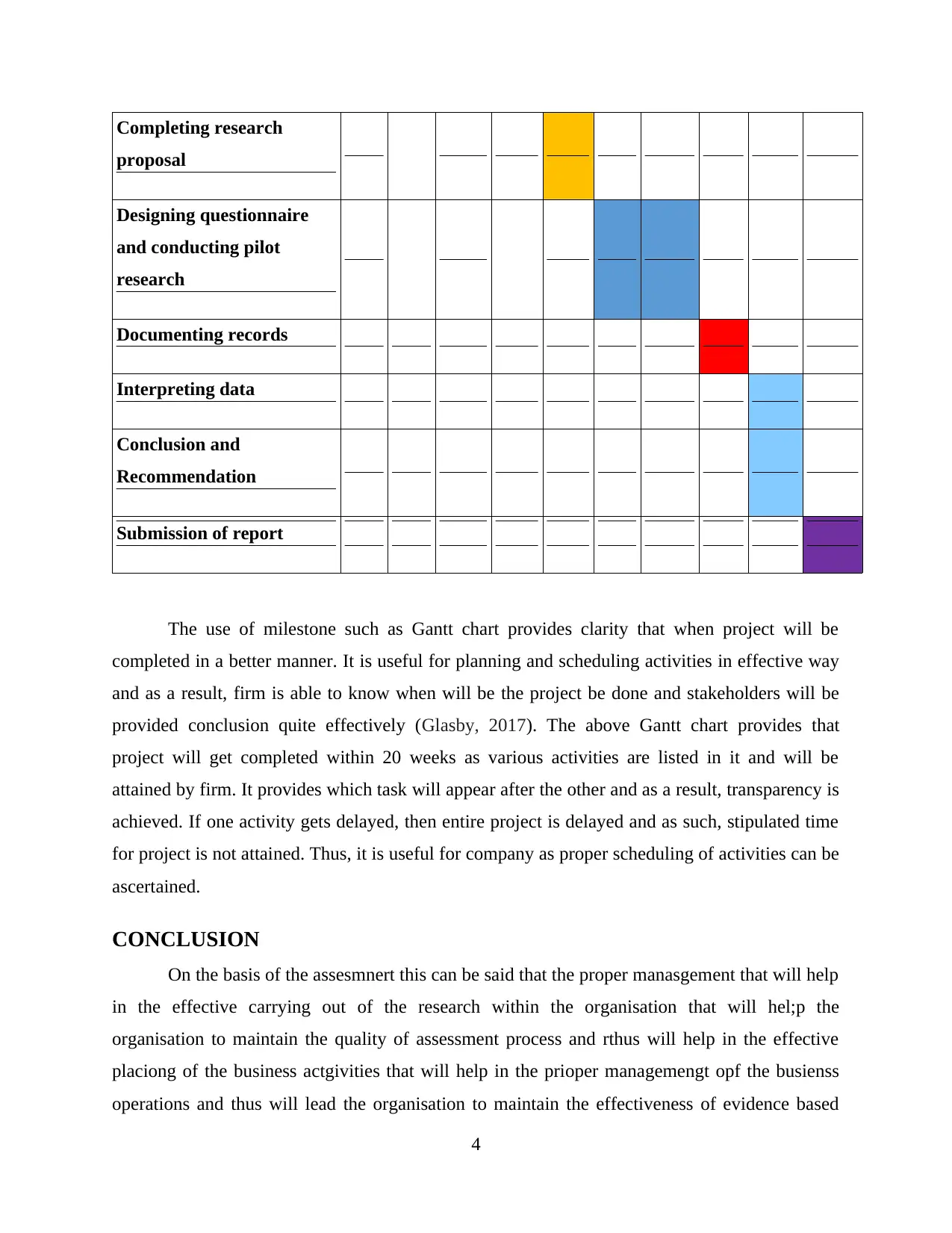
Completing research
proposal
Designing questionnaire
and conducting pilot
research
Documenting records
Interpreting data
Conclusion and
Recommendation
Submission of report
The use of milestone such as Gantt chart provides clarity that when project will be
completed in a better manner. It is useful for planning and scheduling activities in effective way
and as a result, firm is able to know when will be the project be done and stakeholders will be
provided conclusion quite effectively (Glasby, 2017). The above Gantt chart provides that
project will get completed within 20 weeks as various activities are listed in it and will be
attained by firm. It provides which task will appear after the other and as a result, transparency is
achieved. If one activity gets delayed, then entire project is delayed and as such, stipulated time
for project is not attained. Thus, it is useful for company as proper scheduling of activities can be
ascertained.
CONCLUSION
On the basis of the assesmnert this can be said that the proper manasgement that will help
in the effective carrying out of the research within the organisation that will hel;p the
organisation to maintain the quality of assessment process and rthus will help in the effective
placiong of the business actgivities that will help in the prioper managemengt opf the busienss
operations and thus will lead the organisation to maintain the effectiveness of evidence based
4
proposal
Designing questionnaire
and conducting pilot
research
Documenting records
Interpreting data
Conclusion and
Recommendation
Submission of report
The use of milestone such as Gantt chart provides clarity that when project will be
completed in a better manner. It is useful for planning and scheduling activities in effective way
and as a result, firm is able to know when will be the project be done and stakeholders will be
provided conclusion quite effectively (Glasby, 2017). The above Gantt chart provides that
project will get completed within 20 weeks as various activities are listed in it and will be
attained by firm. It provides which task will appear after the other and as a result, transparency is
achieved. If one activity gets delayed, then entire project is delayed and as such, stipulated time
for project is not attained. Thus, it is useful for company as proper scheduling of activities can be
ascertained.
CONCLUSION
On the basis of the assesmnert this can be said that the proper manasgement that will help
in the effective carrying out of the research within the organisation that will hel;p the
organisation to maintain the quality of assessment process and rthus will help in the effective
placiong of the business actgivities that will help in the prioper managemengt opf the busienss
operations and thus will lead the organisation to maintain the effectiveness of evidence based
4
⊘ This is a preview!⊘
Do you want full access?
Subscribe today to unlock all pages.

Trusted by 1+ million students worldwide
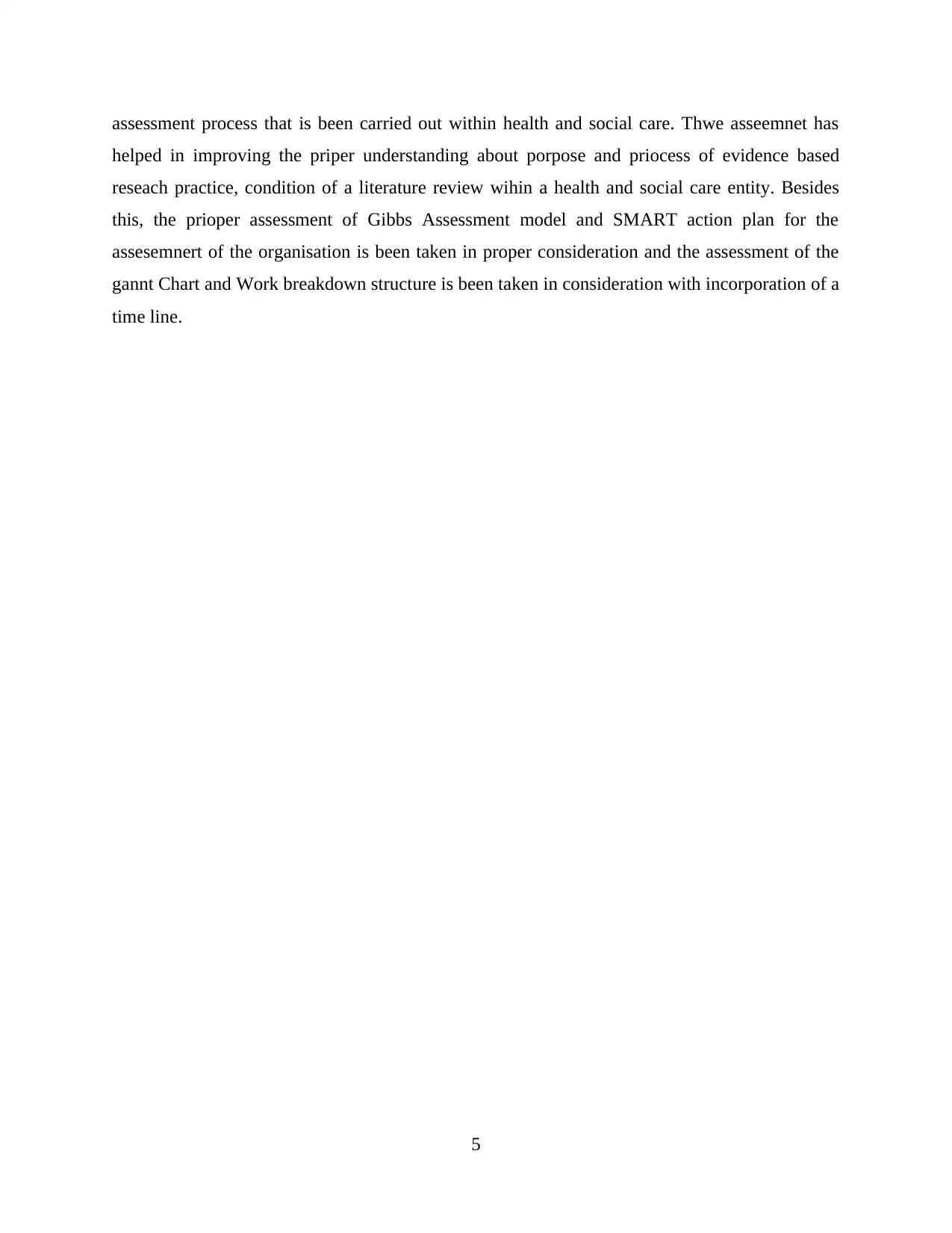
assessment process that is been carried out within health and social care. Thwe asseemnet has
helped in improving the priper understanding about porpose and priocess of evidence based
reseach practice, condition of a literature review wihin a health and social care entity. Besides
this, the prioper assessment of Gibbs Assessment model and SMART action plan for the
assesemnert of the organisation is been taken in proper consideration and the assessment of the
gannt Chart and Work breakdown structure is been taken in consideration with incorporation of a
time line.
5
helped in improving the priper understanding about porpose and priocess of evidence based
reseach practice, condition of a literature review wihin a health and social care entity. Besides
this, the prioper assessment of Gibbs Assessment model and SMART action plan for the
assesemnert of the organisation is been taken in proper consideration and the assessment of the
gannt Chart and Work breakdown structure is been taken in consideration with incorporation of a
time line.
5
Paraphrase This Document
Need a fresh take? Get an instant paraphrase of this document with our AI Paraphraser
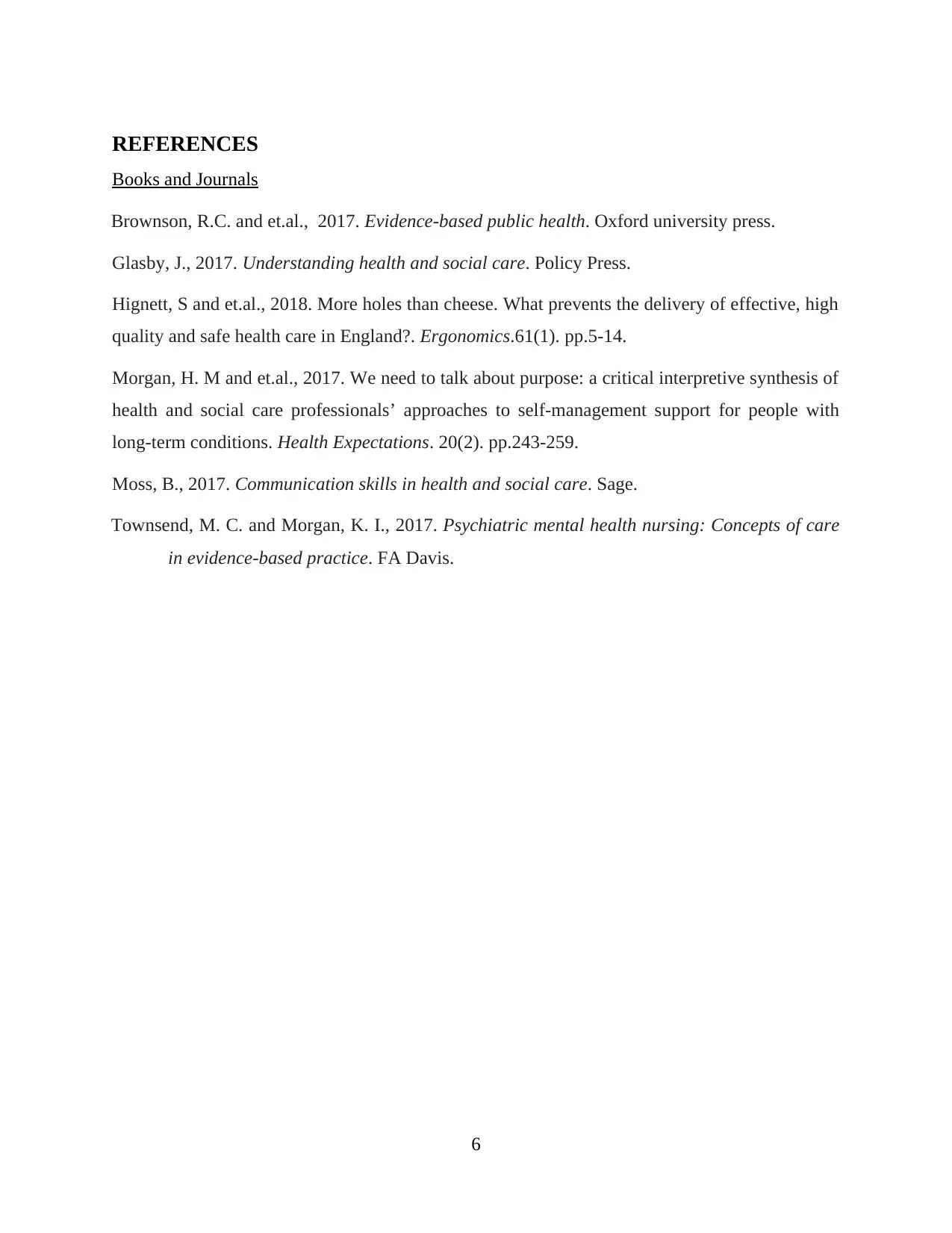
REFERENCES
Books and Journals
Brownson, R.C. and et.al., 2017. Evidence-based public health. Oxford university press.
Glasby, J., 2017. Understanding health and social care. Policy Press.
Hignett, S and et.al., 2018. More holes than cheese. What prevents the delivery of effective, high
quality and safe health care in England?. Ergonomics.61(1). pp.5-14.
Morgan, H. M and et.al., 2017. We need to talk about purpose: a critical interpretive synthesis of
health and social care professionals’ approaches to self‐management support for people with
long‐term conditions. Health Expectations. 20(2). pp.243-259.
Moss, B., 2017. Communication skills in health and social care. Sage.
Townsend, M. C. and Morgan, K. I., 2017. Psychiatric mental health nursing: Concepts of care
in evidence-based practice. FA Davis.
6
Books and Journals
Brownson, R.C. and et.al., 2017. Evidence-based public health. Oxford university press.
Glasby, J., 2017. Understanding health and social care. Policy Press.
Hignett, S and et.al., 2018. More holes than cheese. What prevents the delivery of effective, high
quality and safe health care in England?. Ergonomics.61(1). pp.5-14.
Morgan, H. M and et.al., 2017. We need to talk about purpose: a critical interpretive synthesis of
health and social care professionals’ approaches to self‐management support for people with
long‐term conditions. Health Expectations. 20(2). pp.243-259.
Moss, B., 2017. Communication skills in health and social care. Sage.
Townsend, M. C. and Morgan, K. I., 2017. Psychiatric mental health nursing: Concepts of care
in evidence-based practice. FA Davis.
6
1 out of 8
Related Documents
Your All-in-One AI-Powered Toolkit for Academic Success.
+13062052269
info@desklib.com
Available 24*7 on WhatsApp / Email
![[object Object]](/_next/static/media/star-bottom.7253800d.svg)
Unlock your academic potential
Copyright © 2020–2026 A2Z Services. All Rights Reserved. Developed and managed by ZUCOL.





